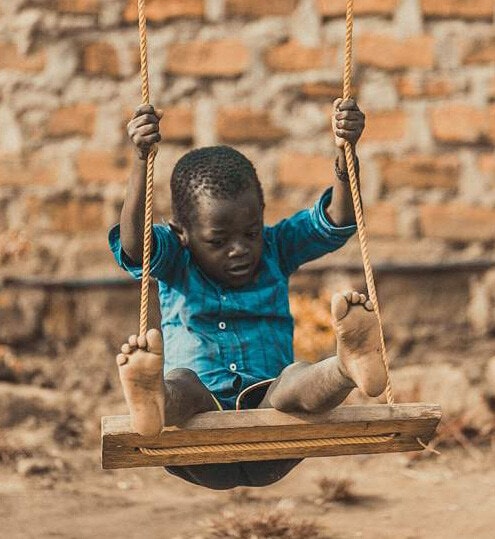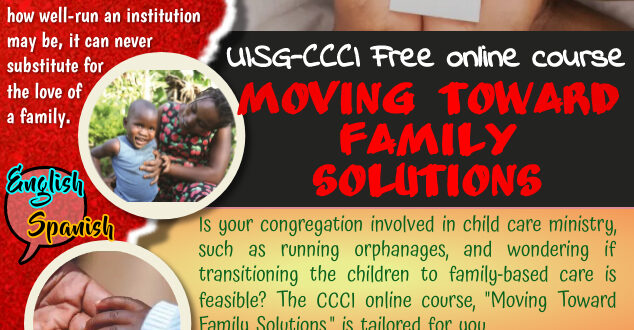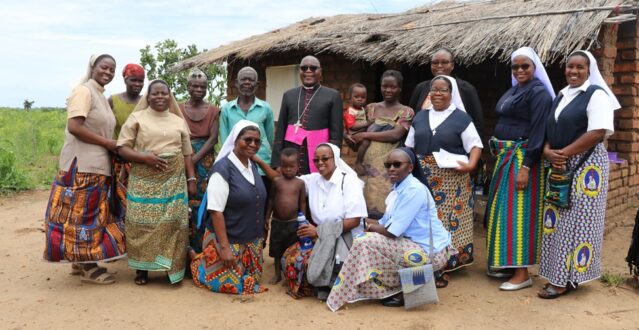As we walk through the Scriptures, under the guidance of the Church, we discover the immense love God has for each person and especially for children. We can also learn the immeasurable role that family has in the revelation of God´s love and the development of each human life to its fullest, as it had in the life of Jesus himself.
Looking at Children Through the Eyes of God
The need to care for the most vulnerable ones
God has a preference for the most vulnerable and little ones. It can be seen throughout the Bible and especially in the many words and gestures of Jesus. He identifies himself with the ones in need and asks us to look after them with joyful generosity. In doing so, we welcome him into our lives (cf. Mt 25:34-40), loving the ones God loves first. This task cannot be deferred if we want to gratefully serve the Lord, thanking him for all he has done for us (cf. Sg 116:12), allowing our lives to be transformed in love: “Let us love, then, because he first loved us” (1 Jn 4:19). Catholic social teaching also confirms us on this path, telling us in one of its principles that we are to care for the poorest and most helpless members of society.
Without a doubt, children are part of those least brothers and sisters of Christ. For this reason, accompanied by the Holy Spirit, we must learn to look at them through the eyes of Jesus. 11 Mark 9:34-37 and Mark 10:13-16 are two important passages that shed an intense light on this reality. These two passages are placed on Jesus’ journey up to Jerusalem and contain a countless amount of wisdom. Here, we will only pencil in some insights on how Jesus turns upside down the vision of his culture in relationship with children and highlight his invitation to serve these little ones in a new and radical way.
Jesus embraces and blesses children
In a society that did not value children as important, both passages show Jesus embracing them and revealing how they are at the center of God’s attention. To the contrary, the behavior of the disciples—who scolded the ones who were bringing children to Jesus—hints that they consider these little ones not to be good enough for the attention of the Master (cf. Mk 10:13). Mirroring the common public opinion, the disciples thought of children as being at the bottom of the ladder, with no voice, ignored, and marginalized in the social arena. But to their surprise, as usual, Jesus shocked them with his unexpected words and far-reaching gestures: “Let the little children come to me; do not stop them,” and “he embraced them, laid his hands on them and gave them his blessing” (Mk 10:14,16).
Jesus wants children to come to him, and he does not allow anyone to prevent it from happening. He desires to embrace, lay his hands upon, and bless children. It is important to note that children are the only ones whom Jesus blesses in the gospel of Mark. Such reality reveals how special children are in the heart of God: they are the extraordinary heirs of the Kingdom (cf. Mk 10:14). Moreover, we are told that in welcoming a child, we are welcoming Jesus himself and the one who sent him: the Father (cf. Mk 9:37).
The word “welcome” is repeated five times in these passages. “To welcome” means to be hospitable, to make a person feel at ease, to receive, to give acceptance, to offer care, to commit with. So we cannot but underline how central and undeniable hospitability of children is in Jesus’ teaching. To welcome children and to receive them is to welcome and to receive the Kingdom. Both realities are linked and cannot be separated. If we recall the parable of the hidden and found treasure, we can say that children are the treasure that comes with the field of the Kingdom of God (cf. Mt 13:4): “Children are a heritage from the Lord, offspring a reward from him” (Psalm 127:3). They are God´s treasure entrusted by Jesus to the disciples and to us, who are called to serve the little ones with loving care (cf. Mk 9:35).
From these passages and many others (cf. Mk 5:21-24, 35-43; 7:24-30; 9:14-29), we can affirm undeniably that Jesus is a friend of children. He places them amid the scene of life because they can never be forgotten or set aside.
Prayer and reflection
- Read Matthew 25:34-40, Mark 9:34-37 and Mark 10:13-16, prayerfully asking God to look at children through his eyes.
- How is God inviting you to look at children?
Family Love Expresses God’s Care
Across Scripture, God shows his love to his people and each person through human loving bonds. In particular, many are the invitations to contemplate God´s face in the expressions of parental and family relationships.
In Deuteronomy 1:31, God is portrayed as one who carries a child. In the passage of Hosea 11:1-4, God is sketched with features of a parent teaching a child to walk, holding a child by the arm, lifting a child lovingly, and bending down to feed the child. God looks after his children with human strings of love.
The words in Isaiah 49:15 witness to the fact that God loves each one of us even more than a mother can ever love her child. In the beautiful Psalm 103:13 we read: “As tenderly as a father treats his children, so the Lord treats those who fear him.”

Human love, and especially family love, is not only a symbol of God but also the most extraordinary way God chooses to extend his love to each person: “God sets the lonely in families” (Psalm 68:6). Therefore, to help each child to be embraced by true love, we need to foster it in all its forms. Primarily and in a greater manner, the emphasis must be put on encouraging, recreating, enhancing, and nurturing family love, where each child can come to the awareness of the marvelous care with which we have been created and come to his or her fullest development: “You must see what great love the Father has lavished on us by letting us be called God’s children—which is what we are!” (1 Jn 3:1).
Prayer and reflection
- Recall and revisit your own experience of God’s love through the experience of human and family love.
Catholic social teaching and its relevance to care for children and vulnerable persons
Catholic social teaching is a central and essential element of our faith. Its roots are in the prophets in the Bible, who announced God’s special love for the poor and called God’s people to a covenant of love and justice. It is a teaching founded on the life and words of Jesus Christ, who came “to bring good new to the poor, liberty to captives…, recovery of sight to the blind” (Lk 4:18-19) and who identified himself with “the least of these,” the hungry and the stranger (cf. Mt 25:44-45). Catholic social teaching is built on a commitment to the poor.
Catholic social teaching is based on and inseparable from our understanding of human life and human dignity. Every human being is created in the image of God and redeemed by Jesus Christ and therefore is invaluable and worthy of respect as a member of the human family.
Every person, from the moment of conception to natural death, has inherent dignity and a right to life consistent with that dignity.
Our tradition proclaims that the person is not only sacred but also social. How we organize society and relationships affects human dignity and the capacity of individuals to grow in community. The family is the central social institution and must be supported and strengthened, not undermined. Catholic tradition teaches that human beings grow and achieve fulfillment in community. We believe children have rights. They have rights to a family and to participate in society.
Prayer and reflection
- What is stirring in my heart?
- How do I and how does my religious congregation value Catholic social teaching and incorporate it in the ministry of care for children?
Every Child Deserves a Caring Family
Family: Its irreplaceable role and challenges
Already from the first pages of the Scriptures, we are presented with the reality of family as the vital set-up for children to flourish. In the early pages of the book of Genesis, we read: “God created man in the image of himself, in the image of God he created him, male and female he created them. God blessed them, saying to them, ‘Be fruitful, multiply, fill the earth and subdue it. Be masters of the fish of the sea, the birds of heaven and all the living creatures that move on earth.’” (Gen 1:27-28). Right from the beginning of creation, God has placed children within a family. Each child coming into this world is naturally placed in the hands of a mother and father. In God’s desire, the family is the right environment for children.
However, at the same time, also from the first chapters of the Bible, we envision how a family is faced with many challenges and tempted by human malice. Experience shows us the many factors that can make families inappropriate for children or lead to separation: death of a mother at delivery, unwanted pregnancies, young mothers who abandon their children, mentally ill parents, domestic violence, wars, migration, exploitation, illnesses, parental death, neglect, extreme poverty, etc. Families cannot be taken for granted. Many efforts and conditions have to be met and mastered for family reality to achieve this identity: the image and likeness of God, a truly loving and suitable place for children to grow (cf. Gen 1:27,4:7).
The Catechism of the Catholic Church (CCC) tells us: “The fecundity of conjugal love cannot be reduced solely to the protection of children, but must extend to their moral education and their spiritual formation. The role of parents in education is of such importance that it is almost impossible to provide an adequate substitute. The right and the duty of parents to educate their children are primordial and inalienable” (CCC 2221). Furthermore, the responsibility of the children’s education belongs first of all to their parents: They are called to fulfill this mission through the creation of a home “where tenderness, forgiveness, respect, fidelity and disinterested service are the rule” (CCC 2221). The family environment is where children can grow into their completest development as they are looked after with care and affection, learning to be loved and to love, realizing what it means to be a person, achieving all the skills that human life requires, receiving their first formative ideas about truth and goodness, and learning their rights and responsibilities in society.
Family is a vital cell of society and essential for the personal growth of every child. Marriage and family are the central social institutions that must be supported and strengthened and never undermined. Moreover, Catholic social teaching affirms that every person, and therefore every child, has the right to his or her own family.
God became one of us in a family
When God became one of us, sharing our vulnerability, he also chose to be born of a woman (cf. Gal 4:4) in the milieu of a loving family with a mother and a father, within a more extended family (cf. Mt 1:18-25; Mk 6:3). The presence of Mary and Joseph was fundamental: they offered the appropriate safe space for Jesus to grow. They provided him with protection, the warmth of a home, healthy relationships, guidance for life, initiation into the Jewish faith, and all the surroundings that the God-incarnate child needed to grow in wisdom and stature (cf. Lk 2:52).
In every aspect of his existence, Jesus shows us God´s ways to have life to the full (cf. Jn 10:10), for only in the mystery of the incarnate Word does the mystery of each human being take on light (cf. Gaudium et Spes 22). The Son of God needed and chose a family in which to be incarnate and to fully mature, revealing to us with his own life how vital the environment of a loving family is for every child to grow into maturity.
Prayer and reflection
- How important it is that each person can experience true family love within the biblical context?
Conclusion
The Bible and Catholic social teaching lead us to the undeniable conclusion that family and parental bonds make the best milieu in which to look after each child and are fundamental in revealing God´s care. We are certain that each family, if it is a caring one, is the most appropriate environment for children to thrive. Family care exceeds institutional care, which should only be a short-time resource when the family or any other family-like alternatives are not possible or suitable at a given moment.
Prayer and reflection
- After reading these lines, what caught your attention?
- What steps can you take in your mission and ministry to provide family-loving care to the children who lack it?
This article is from the publication “A Family for Every Child.” Read the full publication here.








